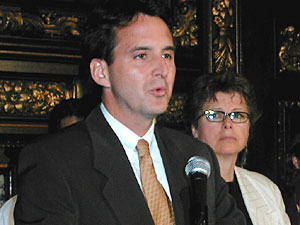Audio
Photos
More from MPR
Resources
Your Voice
| |||||||||||||||||||||||||||||||||||||||||||||||||||||||||||||||||||||||||||
Minnesota: Land of the fee
June 29, 2003
 |
| Gov. Tim Pawlenty says a fee-for-service model of government doesn't contradict his assurance that he wouldn't raise state taxes. (MPR Photo/Laura McCallum) |
St. Paul, Minn. — The two-year, $4.2 billion deficit-reduction package signed into law last month contains at least $200 million in new or increased fees, surcharges, and fines. They're spread across the budget, and include marriage license fees, state park parking permits, and hunting licenses.
Department of Finance officials estimate that if hikes in health care and nursing home co-payments are included, Minnesotans could find themselves paying another $130 million out-of-pocket. Gov. Pawlenty, however, says a fee-for-service model of government doesn't contradict his assurance that he wouldn't raise state taxes.
"We didn't pull a fast one on anybody," says Pawlenty. "We said we were open to some fee increases. We wanted to keep that within reason. We wanted to make sure that that was not the overwhelming source of solving the budget deficit. And it appears that the fee increases account for about five to 10 percent of the solution. We think that's reasonable."
In the courts, a host of filing fees are jumping upwards. Some are relatively minor: issuing a subpoena goes from $3 to $12. Others are more noticeable: the cost of filing an appeal doubles from $250 to $500.
Jim Baillie, president of the Minnesota State Bar Association, says the fees were necessary to avoid deep cuts in court administration and, for the most part, modest. But he says the new costs were accepted with some reservations.
"A lot of people expressed concerns about what we call access to justice concerns. The increase in filing fees could have the effect of discouraging people who, constitutionally, should be entitled to use the courts from doing so," he says.
Pawlenty says there's a philosophical difference between broad-based taxes -- like those on income or purchases -- and narrowly-tailored fees designed to support a specific good or service. But the distinction may be lost on those paying the new fees and surcharges.
Beth Haney, the director of research at the Childrens' Defense Fund-Minnesota, says the budget increases the co-payment for families receiving state-subsidized child care. For a family of three earning roughly $30,000 a year, the payments nearly double to just over $300 a month. Haney says that will hit working families hard.
"Child care is not a luxury," she says. "It's a necessity. Especially if you're just coming off of welfare and you're being required to work, which is great and families are doing that. But we need to make sure that those kids are safe and they're in stable places. And so for those families, it essentially is a tax increase. It's just not called that."
David Strom says that argument is faulty. Strom, the legislative director of the Taxpayers League of Minnesota, the advocacy group that sponsored the governor's no-new taxes pledge, argues that the child care co-pay isn't a tax. Strom says it's simply a way for participants in the program to contribute towards their benefits.
"We charge taxes to pay for general goods. And we charge fees to pay for particular goods for particular individuals. And, in general, we try to make those fees match, more or less, the costs of the service that we're providing," Strom says.
Senate DFLers, however, say if the governor's pledge was meant to protect the pocketbooks of average Minnesotans, the fees, surcharges, and fines are as damaging as tax hikes.
Majority Leader John Hottinger briefly proposed increases in the income tax and cigarette tax to cushion the effects budget reductions. He says that would have spread the burden more widely.
"The income tax increase that we suggested was one way to really do what the administration had indicated they wanted to do, which was share this challenge across all income levels, across all geographic areas of the state. The Pawlenty administration proposal really focuses its costs on low-income people. It focuses its costs on middle-income families who are going to be touched by every one of these fees," according to Hottinger.
Hottinger says an honest calculation of new revenues would also include increased college and university tuition, along with school activity fees that may be assessed at the local level. Adding those in, the new fees would outweigh the income tax increase proposed and then abandonded by Democrats.
|
News Headlines
|
Related Subjects
|

